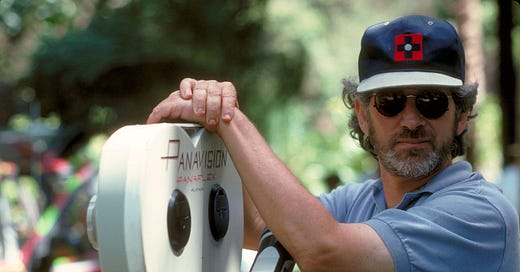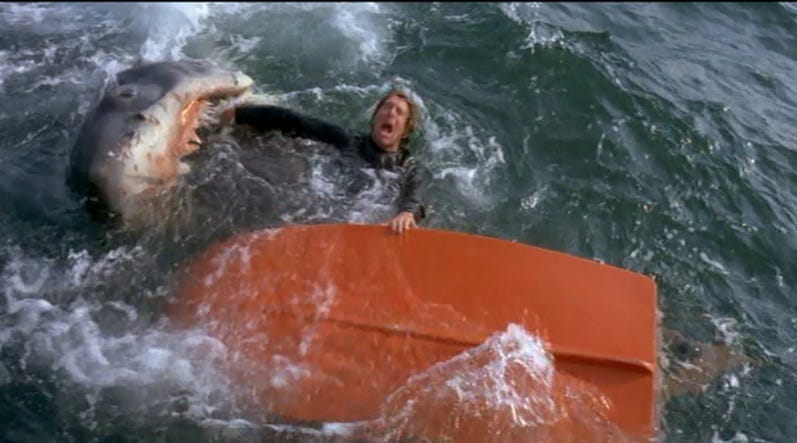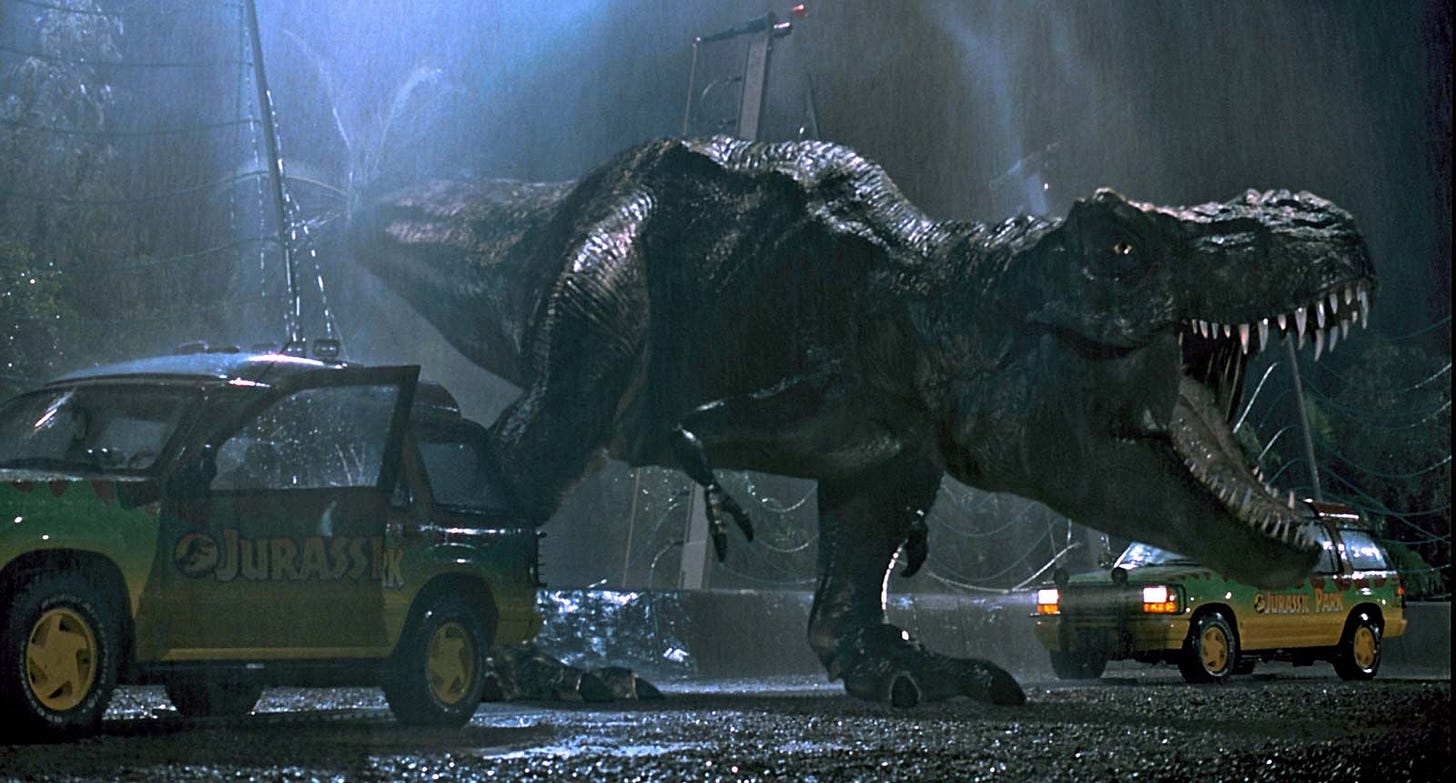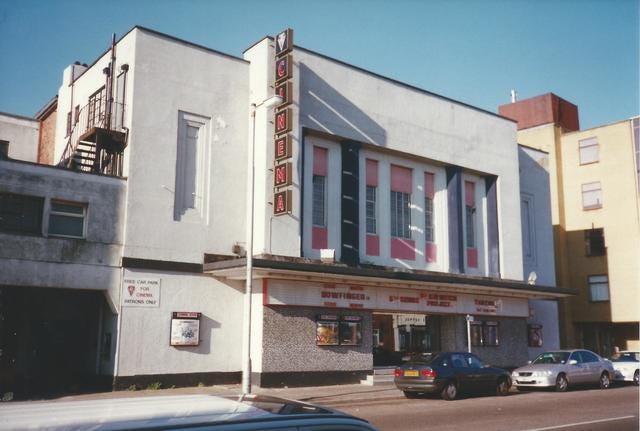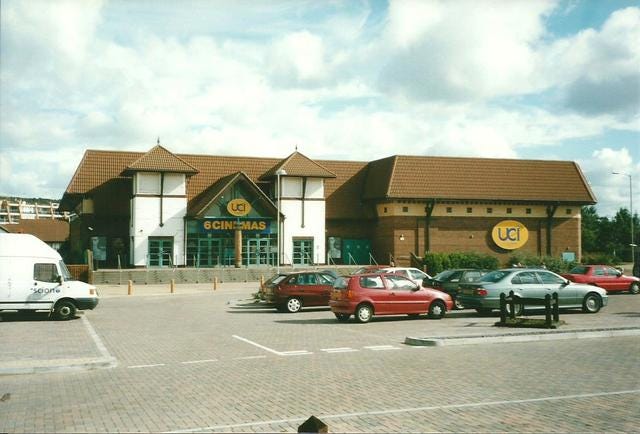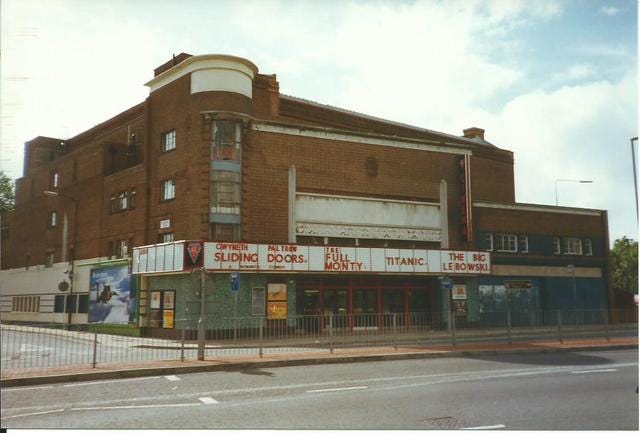In my opinion, Hollywood cinema was never more alive than during the two decades referred to as New Hollywood. This era was split into two very distinct periods; the auteurs, influenced by European cinema who wanted to burn the system down (in Cinema Speculation, Tarantino refers to a dinner where Dennis Hopper told a famous fifties filmmaker that his generation were going to destroy them), and the ‘movie brats,’ who were the first generation to graduate from American film schools and grew up loving old Hollywood. The movie brats wanted to make the best versions of the movies from the era of Hollywood they grew up with. It’s no secret that the likes of Spielberg and Scorsese loved the films of John Ford, particularly The Searchers (1956), so when their turn in Hollywood came, you can be damn sure they wanted to make the best versions of the genre films they loved. Growing up in the late eighties and early nineties, I missed this era of Hollywood firsthand. While I said in the last essay that RoboCop (1987) was the first film I remember watching, two other films had far greater impacts on me during my early years.
Before there were films, there were sharks. I fucking loved sharks when I was a child (still do, if I’m being honest). The first job I ever wanted was marine biologist, specifically so I could study sharks. I didn’t just know sharks on an ‘oh look, I can name a couple of popular, man-eating sharks’ way. I LOVED them. I could name most of them by their Latin names. One time during my teenage years, a group of friends visited the local aquarium and I was able to correctly identify a wobbegong shark when a friend asked. He didn’t believe me and went and asked a guide, only to be told I was correct. I did an extra week of work experience during my summer holidays at 15 because I wanted to do mine at the aquarium but their time scale was three weeks and the school wouldn’t let me take an extra week off to complete it. Suffice it to say, I loved sharks. So, you can probably tell where this is headed.
I don’t want to spend too much time talking about Jaws (1975) because it was never meant to be the focus of this article and I don’t think there is anything I can add to the discourse. My love of sharks meant that everything was lined up for me to love Jaws, and I did. In the last article, I wrote about how I was too young to understand how violent and funny RoboCop was when I first saw it. I wasn’t too much older when I first saw Jaws (five or six years old, I’d guess) and so one would assume it would be a similar experience. All I would focus on was the cool shark. Not the case at all. Something changed in the years between Jaws and Robocop. I knew I was supposed to be scared, and I was. The scene where the wooden pier chases Charlie back to shore? Terrifying. The bit where Quint spits up his blood? Gross. To this day, I still can’t watch the scene where Ben Gardner’s head pops out of the boat without wincing and it took until I was at least twenty for me to able to watch it without looking away.
Interestingly enough, I saw Jaws 2 (1978) before I saw Jaws. As I mentioned in my RoboCop article, I had trouble sleeping when I was a child and would often wander downstairs to see what my parents were watching. One evening they were watching a film about a bunch of boats tied together and a helicopter coming to rescue them. I asked what it was and without thinking my dad explained it was a film about a giant shark attacking people. I could feel the frustration from my mother as she knew that there was no way they were going to get me back into bed now, so they let me stay up and watch the rest of the film. To this day, I enjoy watching Jaws 2 as much as I do Jaws. Jaws is a better film, but Jaws 2 has a sense of fun about it that always draws me back to being a child. My love of the Jaws franchise and shark movies, in general, will no doubt make up a future article.
Jaws, without a doubt, is the film that made me love film as a storytelling medium. Not only did I fall in love with watching films, but it kick-started my creativity and started me on the road to writing my own short stories (everything I wrote in my early days was a rip-off of Jaws). To say Spielberg changed my life with that movie is an understatement, but it was only the first time ‘The Beard’ (as he’s sometimes affectionately known) changed my life. Not only did he make me realise how much I loved film, but he showed me the power of cinema.
When I say the power of cinema, I don’t mean it in the quasi-pretentious sense that cinephiles often use. I mean it in the literal sense. Jurassic Park (1993) is the film that made me fall in love with going to the cinema, sitting in a darkened room with a group of strangers, and being told a story.
It’s 1993. I’m six years old. Like most six-year-olds, I FUCKING LOVE dinosaurs. They fascinate me (as much as I imagine they did/do all other children) because they’re intangible. We know they existed, but all we have is fossils. We don’t know how they looked, smelled, moved, ate, existed, communicated, or lived, we know nothing about them. Yet throughout time, we’ve made educated guesses that present them as giant lizards that dominated the world before us. Jurassic Park promised to bring these monsters to life, and it treated them as the monsters they likely were.
Jurassic Park was the first time I became aware of the marketing machine behind a blockbuster film. Not in the sense that I understand it now, but in the sense that the film was just one part of a bigger picture. We didn’t have YouTube, so it was exciting when we got to see a TV Spot during the ads (the fact Red Pepper was doing the VO for trailers as they released in the UK helped). We had novelisations, an annual, the original novel was released with a reprinted with a cover to match the film’s poster, McDonald’s ran a tie-in promotional, and cinemas were selling drinks and popcorn in Jurassic Park cups and buckets. That year, everyone wanted Jurassic Park toys for Christmas (I had both cars, all the character figurines, and most of the dinosaurs too). Every computer system had a version of the Jurassic Park video game. The Megadrive one was a fun side-scrolling shooter, but the Amiga version was my favourite. It had a first-person shooting section where you had to shoot velociraptors with a shotgun. The film was inescapable. There was no way I wasn’t going to see this film when it landed in cinemas in July.
Jurassic Park premiered in the UK on the 16th of July 1993. It played in Leicester Square, London as well as a small cinema in Carmarthenshire, Wales (this is a fascinating story on its own and I recommend checking it out). It topped the UK box office for eight consecutive weeks, finally being knocked off the top spot by Tom Cruise vehicle, The Firm (1993). In the UK it topped the opening weekend record (beating Bram Stoker’s Dracula (1993)). It became the first film to gross £2 million three weeks in a row. The following week it became the highest-grossing film of all time in the UK. At the end of its run, it was the first film to top the UK box office for eight consecutive weeks. Jurassic Park wasn’t a film. It was an event.
I don’t know when during its run I got to see Jurassic Park, but I remember the feeling. Sitting in the dark, with my family, surrounded by strangers, sharing an experience. Spielberg, as with Jaws, knew exactly how to take monster movie aesthetics and make them applicable to family-friendly blockbusters. The opening sequence is filled with terror, but Spielberg cleverly refrains from showing us the monster. Instead, he waits for the final third of the film until we finally see the velociraptors, and when we do they are far more terrifying than the T-Rex that the film was marketed on. Instead, Spielberg treats us to the spectacle of Brachiosaurus and the incredible T-Rex escaping from its paddock sequence (I don’t care if the geography doesn’t make sense, that scene is a masterwork in tension). Sitting in the dark, I felt every second of tension, of excitement, of fear (I can still hear the ‘oooooo’ as the velociraptor shadow appears over the mural whilst Tim and Lex are eating and the gasp as Ellie realises it is only Mr. Arnold’s arm on her shoulder, followed by the scream as the raptor bursts through the pipes). I was a part of something, a collective, yet at the same time, I was separated from the rest of the audience by the darkness and the fact that I only knew my family. It was special, and I think I’ve chased it ever since. I certainly chased it at the time. Over the eight weeks it ran in the cinema, I saw Jurassic Park five times. Once with my parents, once with each set of grandparents, once with my family and some family friends, and once more with friends. I was electrified and it delivered. Every. Single. Time.
It helped, no doubt, that Spielberg is such a master of the craft. It’s easy for people to say modern Spielberg doesn’t live up to his work in the past, but I believe this is because Spielberg has become the benchmark for how to craft blockbuster family entertainment. We’re so used to seeing the techniques that Spielberg employs to make his movies in the films of others, that they’re no longer enough for when watching one of his films.
I must have gone to the cinema before seeing Jurassic Park. I have no recollection of what the film or films may have been, but there’s no way my parents allowed me to get to six years old without going to the cinema. Scouring the history of Portsmouth cinemas on the Cinema Treasure website reveals that there were four popular cinemas in operation when I was a child in Portsmouth. The ABC at the top of Commercial Road, the Odeon in north end, and the Carlton in Cosham (although this went through a plethora of name changes including Canon cinemas, Reeltime, ABC, and Cineplex). Portsmouth's first multiplex cinema, the UCI, had just opened in Port Solent the year before but was a bit too fancy for us (I wouldn’t get to visit the UCI until 1997 when I went to see The Lost World: Jurassic Park (1997)). The two cinemas I remember visiting most were the Odeon in north end, and the Carlton in Cosham. These cinemas still had multiple screens, but the cinemas were adapted to meet this need as opposed to being designed as multiplex cinemas. I still remember the foyer of the cinema in Cosham. I remember having to buy tickets from a small window at the front of the building. Then you’d head into the dark, sticky, dank foyer. No fancy pick and mixes, ice creams, coffee brands, beers, and other alcoholic drinks like modern multiplexes. You could buy popcorn, a drink of coke or lemonade, and a bag of sweets, each at a price that would bankrupt someone. So reliant on this were they, that as the Cosham cinema came to the end of its life they began searching your bag for sweets as you went in. Once you were in the foyer, you had two choices: downstairs was screen one, the big screen showing the latest films, and upstairs for screens two and three, showing smaller films. It lacked the polish and finesse of the other cinemas in the city, except the ABC on commercial road, but if the cinema in Cosham was trapped in the 70s, the commercial road ABC was trapped in the 80s. Not that it mattered to me, I loved going to the cinema. I saw a lot of formative films from my youth in the Canon/Reeltime in Cosham. Aladdin (1993), Mrs Doubtfire, The Lion King (1994), Congo (a film I will defend until my dying breath), Batman Forever (1995), Toy Story, Mission Impossible, Twister, Independence Day, Dragonheart (1996), I even saw Titanic (1998) there, because my Dad wouldn’t pay for us to see it at the UCI. In short, the place holds a lot of dear memories for me, and its closure in 2007 brought a real sense of disappointment, even if by that time I had moved my viewing habits to the fourteen-screen Vue Cinema multiplex in Gunwharf Quays due to convenience (I could drive by this point and parking in Cosham was always a pain).
I’ve chased the feeling I had whilst watching Jurassic Park for the first time ever since. I go to the cinema at least once a week, often more. The noticeable decline in audiences has meant that it’s harder to find that high. Harder, but not impossible. For a long time, I believed that I had to be in a full crowd to catch it. I remember seeing The Dark Knight (2008) at a sold-out special preview. The Dark Knight was another case where the build-up to release turned it into an event. I remember hearing the uncomfortable laughter when Heath Ledger’s Joker performed the now-infamous pencil trick and the applause when the film ended. I saw The Dark Knight three times in the cinema and, like Jurassic Park, I felt that connection with the audience whilst watching. It made sense, based on these experiences, that I needed that big crowd. Then something peculiar happened. I went to see Steve McQueen’s Shame (2011) on opening day at 9:15 in the morning. Shame is a film exploring sex addiction. We watch an ever-desperate Brandon Sullivan (played brilliantly by Michael Fassbender) look for his next fix until he eventually breaks down and goes on an all-night binge where he (to quote Dennis Hopper) ‘fucks anything that moves.’ It even includes a particularly uncomfortable sequence where Brandon forces himself to go for a run because hearing his sister, Sissy (played by Carey Mulligan) having sex with his assistant makes him horny. Needless to say, a Friday morning screening of Shame didn’t have a bustling crowd. It was me and one other audience member. We sat on opposite sides of the screen and watched a film that at best could be called ‘uncomfortable watching,’ but I would use the phrase grotty, not unlike the foyer of the Canon/Reeltime cinema I grew up with. The film ended. The lights went up. As I was leaving, I locked eyes with the other audience member. I could feel how uncomfortable he felt, and how unclean the film made him feel. He said two words, ‘tough stuff.’ We nodded. Shivered. Then went our separate ways. I had felt that same connection in an audience of two.
Cinemas are no longer like the Canon/Reeltime in Cosham. They are clean and comfortable, the foyers and corridors are well lit. I miss it, there’s something about that environment that felt right for sitting in the dark with a group of strangers, being told a story. Maybe, it’s no wonder that cinema attendance has dropped as the cinemas have become more sterile. Maybe, we need the grot to truly enjoy the process.
References:
Cinema Speculation - Quentin Tarantino.
CinemaTreasures.org - A great website that covers the history of cinema buildings around the world. I sourced the photographs of local cinemas from this website.


